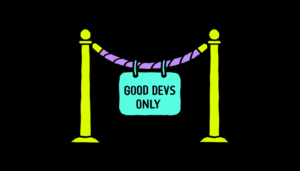You’ve seen the job posts. “Senior Developer: 10+ years required.” You’ve reviewed the resumes. “Tech Lead with decades of experience.” You’ve conducted the interviews, checked the references, and hired what looked perfect on paper.
Then reality hits: Your “senior” hire struggles with basic architectural decisions. They can’t explain their own technical choices. And that decade of experience? It’s looking more like one year repeated ten times.
Sadly, you’re not alone. At Lemon.io, we’ve conducted thousands of technical interviews, and quickly discovered that years of experience are often the least reliable predictor of actual expertise. It’s why our vetting process rejects 98.8% of applicants—many with impressive resumes and lengthy careers.
Ready to stop gambling on senior talent? Let’s break down what separates elite developers from those who only look good on paper.

Time Served ≠ Skills Earned: The Industry’s Biggest (and Costliest) Hiring Mistake
“Experience isn’t just about time served,” says Greg T., who has spent 3 years interviewing developers at Lemon.io. “I’ve seen developers with three years of deep, intentional practice outperform those with a decade of surface-level exposure. The difference isn’t years—it’s depth.”
Greg also had a particularly memorable experience interviewing an intern who showed better code quality, engagement, and analytical thinking than many mid-level developers.
The industry’s obsession with equating time to expertise has created a dangerous illusion. Companies are making critical hiring decisions based on a metric that tells us surprisingly little about a developer’s actual capabilities.
For instance, in our technical interviews, we regularly encounter developers who:
- List “lead developer” roles but can’t explain basic architectural decisions they supposedly made
- Claim to have built high-scale systems but can’t discuss how they handled performance bottlenecks
- Show thousands of GitHub commits that turn out to be automated dependency updates
- Present impressive portfolios filled with projects they barely contributed to
Overlooking these could become a financial drain for your business.
“The true cost of hiring the wrong senior developer isn’t just the $54K recruitment fee,” warns Ira Prokopiv, Tech Interviewers Coordinator or Recruiting Operations Analyst at Lemon.io. “Our 2024 analysis revealed the real damage: nearly $500K lost in just eight weeks, with $398K from team disruption alone. When a ‘senior’ hire can’t deliver, entire engineering teams grind to a halt. That’s why we reject 98.8% of applicants—because the cost of getting it wrong is staggering.
Fake It Till You Make It? How “Senior” Developers Cut Corners
It’s never been easier to fake experience. Between AI-generated portfolios, title inflation, and the abundance of copy-paste solutions, many developers have mastered the art of appearing senior without developing senior-level thinking.
Here’s what our technical interviewers have learned to watch for.
GitHub Padding
“I’ve seen profiles with thousands of commits that tell a very different story under scrutiny,” Greg notes. “Quantity rarely equals quality. We’re more interested in the thinking behind the code than the amount of it.”
Here’s what we look for beyond the surface metrics:
- Real development work: When a developer shows daily GitHub activity for a year straight, it often means they’re using automation tools to appear active. We look for varied, meaningful code changes instead of artificial activity.
- Original projects: Copy-pasting popular projects is easy. We look for developers who build their own solutions and can explain every decision they made along the way.
- Quality over quantity: A single well-built project with clear documentation and thoughtful testing tells us more than 100 copied projects with minor changes. We want to see how developers think, not how well they can copy others.
- Purpose behind changes: Anyone can add thousands of lines of code. We look for developers who can explain why each change was necessary and how it improved the project.
When evaluating GitHub profiles, focus on:
- Original repositories with clear documentation
- Meaningful commit messages that explain reasoning
- Contributions that solve real problems
- Code that shows architectural thinking
“The best GitHub profiles tell a story of growth and learning,” explains Greg. “But an empty GitHub profile isn’t always a red flag—many devs keep their code private. So, we’re not impressed by daily commits—we’re impressed by developers who can explain every architectural decision in their code.”
Title Inflation
Being called a “Senior Developer” at your last job doesn’t automatically make you one.
“Senior Developer titles have become participation trophies,” notes Ira. “We’ve seen candidates with ‘Senior Architect’ titles who couldn’t explain basic system design choices in their own projects.”
Through our vetting process, we’ve found that only 1.2% of applicants show true senior-level capabilities, regardless of their previous titles.
Here’s what real seniority looks like beyond the title:
- Technical leadership: Can they brainstorm solutions to complex problems and coordinate workflow to produce business value?
- System understanding: Do they grasp the entire programming stack, from hardware to high-level implementations?
- Problem-solving depth: Can they profile applications, identify performance bottlenecks, and understand why solutions work?
- Knowledge transfer: Can they present solutions to both technical and non-technical audiences effectively?
Red flags we consistently spot:
- Quick promotions without corresponding skill growth
- Inability to explain past project architectures
- Over-reliance on framework features without understanding the fundamentals
- Limited experience with system-level decision making
“A real senior developer should be able to draw their system architecture on a whiteboard and defend every decision,” explains Greg. “Titles don’t sway us—technical reasoning does.”
Pattern Matching Without Understanding
“There’s a big difference between knowing how to use a solution and understanding why it’s the right solution,” explains Greg. “We regularly see candidates who can implement complex features but freeze when we ask them to explain their architectural choices.”
Signs you’re dealing with a pattern matcher:
- Copy-paste programming: They find similar solutions but can’t adapt them to new contexts
- Framework dependence: They can follow framework tutorials and basic implementations but struggle when they hit errors or edge cases
- Surface-level answers: They can describe what code does but not why it’s designed that way
- Resistance to alternatives: They stick to familiar patterns even when better options exist
To test for real understanding, we challenge candidates to:
- Break down complex problems into manageable pieces (like splitting a monolithic app into microservices)
- Handle unexpected scenarios (What happens when your API fails? When data is corrupt?)
- Explain trade-offs in their decisions (Why choose SQL over NoSQL? GraphQL over REST?)
- Demonstrate deep technical knowledge (Not just how to use Redux, but why it works)
- Adapt to changing requirements (What if this needs to scale to 1M users tomorrow?)
The developers we hire don’t just know patterns—they understand principles. When we change requirements mid-interview, they adapt. When we question their choices, they reason through alternatives. That’s the difference between pattern matching and true expertise.
Technical Interviews Are Broken. Here’s Our Solution
Traditional technical interviews often fail to catch expertise gaps. They focus on algorithmic puzzles or framework-specific knowledge rather than assessing real problem-solving capabilities.
At Lemon.io, we’ve developed a different approach.
We Test What Actually Breaks (Not Theory)
We skip theoretical puzzles for actual challenges: handling corrupt data, fixing memory leaks, and optimizing bottlenecks. Our developers maintain a high project success rate because we test them with real scenarios, not textbook problems.
“And we don’t ask Google-able questions,” Ira explains. “Our technical assessments mirror actual project challenges. We want to see how developers think, not how well they’ve memorized documentation.”
We Go Deep (Because Production Problems Do)
Many “senior” developers can implement features but crumble when systems break in production. They know how to use tools but don’t understand how they work—a prescription for disaster when scaling applications.
That’s why we probe deep technical knowledge: memory management, compilation processes, and system optimization. When a developer explains not just how garbage collection works but how to optimize for it, we know they can handle real production challenges.
Take React’s virtual DOM: anyone can use it, but our developers understand the different algorithms behind it—which is why they can optimize rendering performance when frameworks hit their limits.
We Stress Test System Design
Most developers can follow established patterns, but what happens when your application needs to handle 10x the load overnight? Or when your monolithic architecture starts cracking under pressure? That’s when system design expertise becomes critical.
We challenge developers with real scaling scenarios from our clients’ projects. When a developer can confidently discuss multiple approaches to handling sudden traffic spikes—weighing costs, implementation time, and maintenance overhead—we know they can architect solutions that grow with your business.
We Test Communication, Not Just Code
Ever had a brilliant developer who couldn’t explain their solutions to the team? Or worse, built the wrong features because they misunderstood the requirements? Technical excellence means nothing if it can’t be communicated effectively.
We simulate real-time project scenarios where developers must explain their architectural decisions to non-technical stakeholders. When a developer can clearly justify choosing microservices over a monolithic architecture—and adapt their explanation for both CTOs and product managers—we know they can prevent costly misunderstandings before they happen.
We Simulate Your Worst Day
Anyone can write clean code when they have unlimited time and access to Stack Overflow and Copilot. But what happens when you need to debug a production issue while the CEO is breathing down your neck? That’s when real coding skills show.
We put developers in realistic pressure scenarios, complete with shifting requirements and tight deadlines. When they can maintain code quality while adapting to new constraints—and clearly explain their decisions along the way—we know they can handle your project’s most critical moments.
We’re watching (in real-time) how candidates:
- Structure their approach
- Handle uncertainty
- Use available resources
- Respond to feedback
- Consider extreme scenarios (like system crashes or data corruption)

We really wanted to work with high-end talent, the candidates who hold their own. The candidates we were receiving from Lemon.io straight away were high quality.
Skip the Vetting, Get the Talent
The myth of equating years with expertise isn’t just wrong—it’s expensive. When you build teams based on real expertise rather than time served, you get:
- Faster problem resolution
- Better architectural decisions
- More sustainable codebases
- Stronger technical leadership
The next time you evaluate a senior developer, look beyond the years. Ask about their problem-solving process. Probe their architectural thinking. Test their ability to explain complex concepts simply.
Because true expertise isn’t about time served—it’s about depth of understanding, adaptability, and the ability to make sound technical decisions. And those qualities don’t always come with years of experience.
Sounds exhausting? It is. That’s why we did it for you. We’ve already rejected 98.8% of developers to find the ones worth your time.
Ready to work with the top 1.2% of senior developers? Start hiring.









